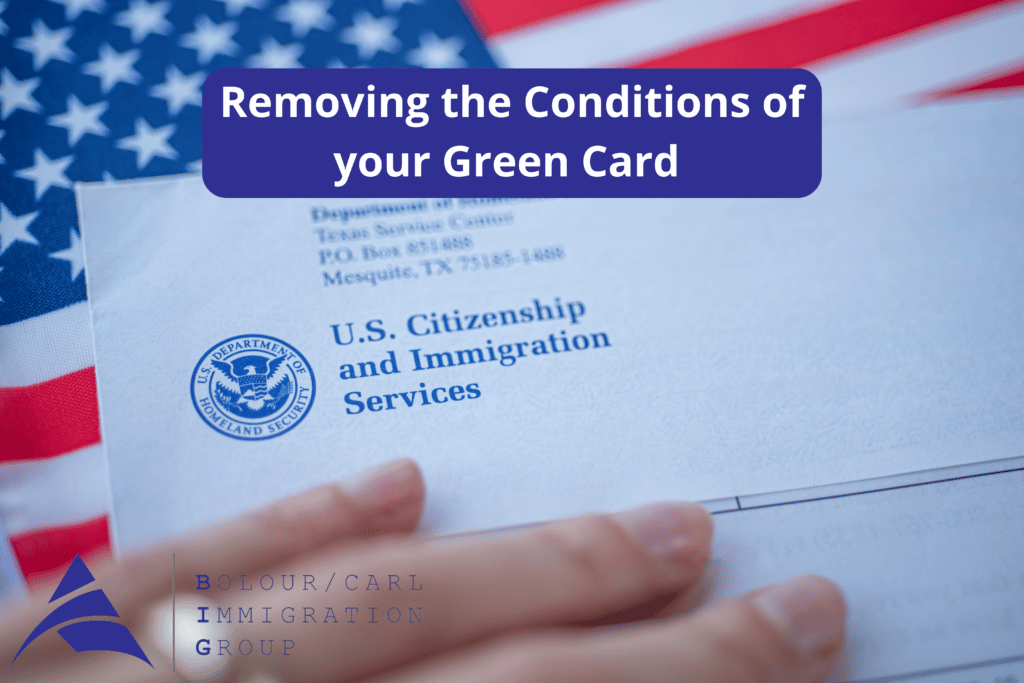
If your green card is based on marriage to a U.S. citizen or lawful permanent resident, you are considered a conditional permanent resident if the marriage was less than two years old on the day your green card was granted. Your conditional green card is valid for two years and, before it expires, you must file a petition to remove conditions on residence. If your application is successful, you will be granted an unconditional green card that is renewable every 10 years.
Petition to Remove Conditions
If you and your spouse are still married, you can jointly file Form I-751, Petition to Remove Conditions on Residence. If you have children who also became conditional permanent residents through your marriage, you can include them on your petition if they received their status at the same time or within 90 days of you. Otherwise, they will have to file separate applications, jointly with their stepparent.
Options If You Are No Longer Married
If you entered into the marriage in good faith but you are no longer married, you can still apply to have the conditions removed, but your application will require an extra step. You will still use Form 1-751, but since you can no longer submit your application jointly with your spouse, you will have to request a waiver of the joint-filing requirement.
Keep in mind that if your marriage ended in divorce or annulment, U.S. Citizenship and Immigration Services (USCIS) will examine your application with a great deal of scrutiny, and you will almost certainly be called for a personal interview. If you and your spouse are no longer together, it is especially important that you seek upfront counsel from an experienced marriage-based green card lawyer, who can examine the facts of your case and recommend ways to strengthen your application.
Other Grounds to Request a Waiver
Divorce and annulment are not the only reasons for requesting a waiver of the joint filing requirement. You (and your children) can also request a waiver if your spouse is deceased; if you and/or your child were subject to extreme cruelty; or if you can prove that the termination of your status and removal from the United States would result in extreme hardship.
When to File
When filing jointly with your spouse (or stepparent), Form I-751 must be submitted during the 90-day period immediately before your conditional residence expires. Failure to file a timely application could result in loss of status and removal from the country.
If you are unable to apply jointly, you can request a waiver of the joint filing requirement at any time before, during or after the 90-day period before your conditional residence expires.
If you are still married but legally separated and/or going through a divorce or annulment, you may file a waiver request before the divorce is final. USCIS will then send you a request for the final divorce decree or annulment.
Processing applications to remove conditions on residence takes a considerable length of time, especially in the wake of the pandemic. To allow for processing, USCIS will issue you a receipt-of-application notice on Form I-797 that will extend your conditional residence status for 24 months. (This was recently increased from 18 months due to longer-than-normal processing times.)
Evidence That Your Marriage Was Real
Before removing conditions on your residence, USCIS will evaluate several pieces of evidence to ensure that your marriage was bona fide and not simply a ruse to secure immigration benefits. Even if you are filing jointly, it is advisable to consult with an experienced marriage-based green card lawyer, who can ensure that your application is filled out property and accompanied by a robust package of supporting evidence. This will help ensure the application is processed smoothly while increasing the likelihood that USCIS will choose to waive the in-person interview requirement.
You will need to demonstrate the circumstances of your relationship from the wedding date through the present, as well as circumstances surrounding the end of the marriage, if applicable.
The most persuasive evidence of a bona fide marriage is a child. If you and your spouse have a child or children together, submit copies of their birth certificate(s) listing both of your names as parents, or, in the case of adoption, records that show you jointly adopted the child or children.
Documents showing that you lived together are also compelling proof that the marriage was bona fide. These can include a joint lease agreement, mortgage agreement, or property deed, in addition to a homeowners’ or renters’ insurance policy and utility bills listing both your names.
As married couples often share financial resources, evidence of joint savings and checking accounts with transaction history and joint federal and state tax returns can also support your case. If you and/or your spouse listed each other as beneficiaries on life insurance policies, wills, and other accounts, this evidence can also be submitted.
Photos, travel itineraries, and invoices from your honeymoon or other joint vacations can also provide supporting evidence, as can records of emails, texts, and letters that you and your former spouse sent to each other, along with cards and letters you received as a couple from other people.
Your application should also include affidavits sworn to by at least two people who have known both of you since your conditional residence was granted and who can speak about your relationship. Keep in mind that these individuals may be called to testify before an immigration officer.
Additional Evidence
If you are requesting a waiver of the joint filing requirement, you must submit additional relevant evidence depending on the circumstances, such as the death certificate of your spouse (or stepparent), the final divorce or annulment decree, or evidence of abuse or that your removal from the country would result in extreme hardship.
At Bolour/Carl Immigration Group, we can assist you with your application to ensure its completeness and provide guidance on how to strengthen your evidence package. If you would like to speak to a marriage-based green card lawyer, contact us at 323-857-0034 or [email protected].




